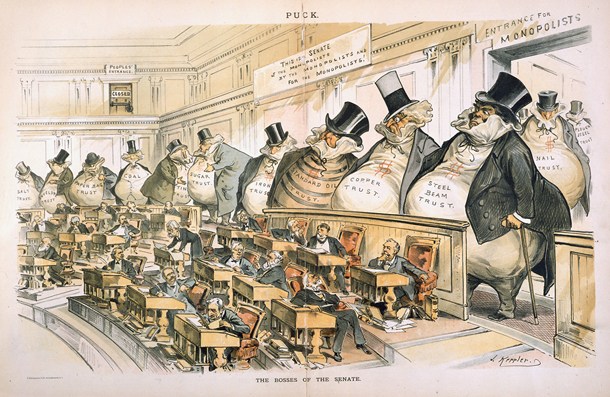America Has a Monopoly Problem

For me the problem with monopolies is seeing the same shopping mall with a Starbucks, CVS and Walmart wherever you drive in America. An economy run by billionaires and monopolists is boring. Stiglitz begins his piece by describing this sad state of affairs in America today. It's kind of a bummer but follows with concrete ideas about solutions. Keep calm and read on 🤙
There is a widespread sense of powerlessness, both in our economic and political life. We seem no longer to control our own destinies. If we don’t like our Internet company or our cable TV, we either have no place to turn, or the alternative is no better. Monopoly corporations are the primary reason that drug prices in the United States are higher than anywhere else in the world. Whether we like it or not, a company like Equifax can gather data about us, and then blithely take insufficient cybersecurity measures, exposing half the country to the risk of identity fraud, and then charge us for but a partial restoration of the security that we had before a major breach.
It's a bit of a depressing picture, and at first hard to see the relation between drug prices, the Equifax cybersecurity breach and individual's frustration's with cable and internet prices. Seeing the connection between these problems requires zooming out and understanding more about America's political economy as a whole. Stiglitz covers a bit of American history..
America has been here before
- In response to monopolists of old, the American government passed the Sherman Anti-Trust Act of 1890.
- This legislation and legislation that followed sought to restore competition to the marketplace. The purpose of this legislation was to build a society where people could be free from consolidated monopoly power. Today we think about monopolies and economics in terms of "consumer welfare", basically lower prices, but this was not the original intent of antitrust legislation.
Laws to ensure competition in the marketplace were based on the belief that concentrations of economic power inevitably would lead to concentrations in political power.
- Focusing only on "consumer harm" drastically narrows the scope of existing legislation to the realm of technocratic economists and wall street bankers, exactly the type of people antitrust legislation was meant to reign in. Fair competition laws, antitrust laws, are about the structure of society and political economy in a democracy, not about making sure consumers get the lowest price. This debate between financial power and protections of individual freedoms dates back to the founding fathers, Jefferson v.s. Hamilton.
Affects of lackluster antitrust enforcement in America
- There has increase in the market power and concentration of a few firms in industry after industry.
- Increase in prices relative to costs
- Lower standard of living
- Lower wages
- Increase in wealth inequality
- Rise of oligopolies and monopolies that control politicians, lobbyists and American democratic process
- Slowdown of productivity and growth
- Offshoring production to other countries
- Reduced product innovation
- Financialization of the American corporation. Shift from producing and selling goods at a fair price to structuring assets in a way that benefits Wall St financiers.
- Increased vulnerability to cybersecurity threats and foreign nation states. Weaker national power.
Microsoft monopoly
Firms like Microsoft led in the innovation in creating new barriers to entry. How could one compete with a browser provided at a zero price? New forms of predation were created, and pre-emptive mergers—buying cheap potential competitors before they could be a competitive threat and before an acquisition would receive antitrust scrutiny—became the norm. Even after Microsoft’s anti-competitive practices were barred, their legacy of market concentration continued.
Conclusion
Monopoly power in America is probably the greatest problem you've never heard of. Until recently the last time I thought about monopolies was my tenth grade U.S. history class. This article by Joseph Stiglitz goes on to detail the affects of concentrated corporate power on labor and globalization. He talks about why it matters, the state of our political economy and potential remedies. Here are some concluding remarks from the article:
Making markets work—reforming our economy so that it looks more like the competitive market ideal of the college textbook—requires a comprehensive agenda. I have already described how the new high-tech firms have been innovative in avoiding taxes, extracting rents from all sides of the market, and entrenching their market power. We need, consequently, corresponding innovation on the public side.
Remedy ideas from the article
- Large multi-nationals have an unfair competitive advantage over smaller firms because of their greater ability to avoid taxes—this needs to be stopped.
- Antitrust has to be rewritten, now that we understand that the “natural” state of the economy is characterized by imperfect markets—imperfect information, incomplete markets, imperfect capital markets, and most importantly, imperfect competition.
- It should be a violation of antitrust laws to engage in the abuse of market power, no matter how acquired.
- Pre-emptive acquistions, buying companies before they become a competitive threat need to be questioned.
- Organizing the many in a countervailing political force is necessary... As was true at the beginning of the Progressive era, so too today: Much is at stake—not just the efficiency of our market economy, but the very nature of our democratic society.
Further resources
- Google Antitrust Lawsuits Explained: this post goes through and explains in simple terms the three lawsuits pending against Google that are being brought by the U.S. Justice Department, State of Texas and a coalition of many states.